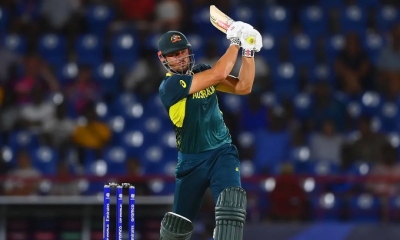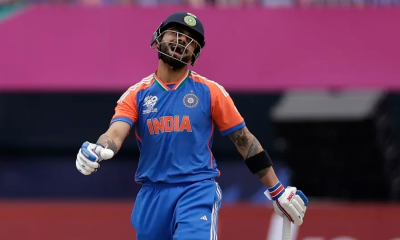Latest News
Maxwell massacre downs Ruturaj masterclass in Guwahati

Glenn Maxwell’s third T20I ton, the joint-fastest by an Australian in the format, headlined Australia’s imperious chase of 223 in a last-ball finish against India in Guwahati on Tuesday (November 28). Skipper Matthew Wade played the ideal foil with a 16-ball 28 as the duo got Australia home after having joined hands with 89 needed off 39 balls. The Maxwell special overshadowed a masterly maiden T20I ton from Ruturaj Gaikwad earlier in the evening. This result keeps the series alive at 2-1 in India’s favour with two games to go.
Australia seize the early advantage
Unlike the T20I at Trivandrum, Australia started proceedings with a bang here with two of last game’s stars, Yashasvi Jaiswal and Ishan Kishan, both perishing well inside the first six overs. With a hint of swing on offer, Jason Behrendorff got one to shape away past a charging Jaiswal who could only nick a slash through to Wade. Shortly, Kane Richardson got a gifted wicket as Kishan’s back foot cut found short extra cover to perfection. It was just the start Australia needed after Wade had opted to bowl in dewy conditions
Ruturaj, Suryakumar do the rebuild act
With early wickets lost, India needed a partnership to launch at the back end. Ruturaj along with skipper Suryakumar Yadav steadied the ship with a partnership of 57 that came off just 47 balls. The latter was the aggressor as he took the bowling on from the get-go, even as Ruturaj dropped anchor with the aim to bat through the innings. Slowly but steadily the duo managed to infuse impetus into the innings as the pitch eased out into a batting beauty after the initial swing had disappeared.
A maiden T20I wicket to remember for Hardie
With the partnership between Ruturaj and Suryakumar looking ominous, Australia were desperate for a breakthrough. In his second spell, Hardie did just that by dismissing Suryakumar through a soft dismissal. It was the pacer’s first wicket in the format and one that he’ll cherish for a long time. The breakthrough also gave Australia some respite going into the back end.
Ruturaj shifts into top gear
Till Suryakumar’s dismissal, Ruturaj had been the silent partner although he also steadily upped his strike rate. But after losing his skipper, the 26-year-old took center stage and went into overdrive in the back end of the innings. For the record, the first 22 balls of Ruturaj’s innings produced 22 runs and he then went on to hammer 101 off the next 35 balls. His innings was studded with 13 fours and seven sixes as Ruturaj dominated the 141-run stand off just 58 balls with Tilak Varma.
Maxwell’s 20th over
As if Ruturaj’s blitzkrieg wasn’t bad enough for Australia, captain Wade was forced to give Maxwell the ball for the final over after Kane Richardson suffered an undisclosed injury. Not only was it an unfavourable matchup with the off-spinner bowling to the right-hander in Ruturaj amidst heavy dew, Maxwell also hadn’t bowled an over in the game prior to that point. The visitors paid dearly for the move as a whopping 30 runs came off the over as India soared past the 220-run mark.
Australia start off with a bang
Travis Head’s first game of the series wasn’t as memorable as his outing in the ODI World Cup final but the left-hander gave the Aussies much-needed momentum early in the run chase. There were a lot of his signature cuts and pulls as he backed away to upset the rhythm of India’s bowlers.
India chip away at the wickets
Makeshift opener Hardie and Head fell after providing a brisk start while Josh Inglis suffered a failure as India hit back with regular wickets. The decision to promote Marcus Stoinis to no.5 proved to be a tactical failure as the all-rounder simply struggled to get going, thereby heaping the pressure of the asking rate on Maxwell. At 128/5 in the 14th over, the target seemed a long way away despite the favourable chasing conditions on offer.
Maxwell unleashes the ‘Big Show’
Like in the game against Afghanistan in the ODI World Cup, the game wasn’t finished till Maxwell was around. He constantly found the ropes and also cleared it at will to keep Australia afloat, even if only just. Australia went into the final five overs needing 78 and despite getting 13 off the 16th over bowled by Avesh Khan, the asking rate surged past 16 runs per over. Understandably, Suryakumar gambled by bringing Arshdeep Singh in the 17th over to ramp up the required rate but that over went for 18 including huge sixes off the first two balls. India were clearly feeling the heat now. Prasidh Krishna, however, calmed the hosts’ nerves with a solid 18th over that went for just six runs leaving 43 to get off the last 12 balls.
Did Suryakumar miscalculate?
With just five specialist bowlers to work from and given that none of the part-time options had bowled, it meant that Suryakumar was forced to bowl Axar Patel in the penultimate over of the innings with the left-hander Wade taking strike. The over went for 22 including a pivotal no-ball moment when Ishan Kishan’s stumping appeal on being sent upstairs had the third umpire changing the initial wide call to a no-ball. The keeper had collected the ball marginally in front of the stumps, a matter that may not have been noticed if not for his stumping appeal. Australia and Wade didn’t mind it one bit as the Free Hit went sailing for six. Australia needed 21 off the final over.
The full circle moment for Maxwell and Prasidh
After bowling an impressive 18th over, Prasidh would have felt quietly confident of defending 20 in the final over even with the wet ball, dew and a rampaging Maxwell to contend with. However, the young pacer wilted under pressure from the get-go. Wade hammered the first ball for four and then unintentionally got a single to get Maxwell on strike. The equation came down to 16 needed off four balls. Earlier on with the ball, Maxwell had conceded 18 off the last four legal balls he bowled including a wide. It was his chance to redeem himself and that’s exactly what he did. A widish hard length ball was slapped over deep point for six and another slower widish ball found the fence again. After potentially bowling a clinching 18th over, Prasidh had lost the plot. An agricultural slog from Maxwell found the fence again, meaning that just two were needed off the final ball. Perhaps, the game was done even before Prasidh bowled the final ball and the inevitable slot ball was pumped back over the bowler’s head leaving the bowler with the most expensive figures for an Indian bowler in a T20I. Australia had survived through a Maxwell miracle yet again.
Brief scores:
India 222/3 in 20 overs (Ruturaj Gaikwad 123*, Suryakumar Yadav 39, Tilak Varma 31*) lost to Australia 225/5 in 20 overs (Glenn Maxwell 104*, Travis Head 35, Matthew Wade 28*; Ravi Bishnoi 2-32 ) by five wickets
Latest News
Implementation of the loan scheme, “Sustainable Agriculture Program”

With the objective of enhancing the living conditions of the agricultural community and increasing the contribution of the agricultural sector to the GDP, ‘Smallholder Agribusiness Partnerships Programme’ is being implemented with the financial contribution form the government and the International Fund for Agricultural Development.
The Ministry of Agriculture, Livestock, Lands and Irrigation is
implementing the program in collaboration with the Regional Development Department of the Central Bank of Sri Lanka. All recoveries from loans provided under the program shall be directed to a revolving fund titled the “Sustainable Agricultural Fund”, which shall be utilized exclusively for the provision of
agricultural loans. Using the said fund, it is proposed to implement an agricultural loan scheme titled the “Sustainable Agriculture Programme” for individuals and institutions engaged in agriculture and related activities.
It is expected that an amount of Rs. 800 million from the funds available in the Sustainable Agriculture Fund will be allocated for the implementation of the Sustainable Agriculture Program in the year 2026.
Accordingly, the Cabinet of Ministers approved the proposal made by the President in his capacity as the Minister of Finance, Planning and Economic Development to implement the “Sustainable Agriculture Program” loan scheme through the Participatory Finance Institution as an annual program from the year 2026.
Latest News
Cabinet nod to implement ‘Suraksha’ Student Insurance Programme in the year 2025 / 26

The Ministry of Education, Higher Education and Vocational Education has entered into agreements with Sri Lanka Insurance Corporation General Limited to execute the Suraksha Student Insurance programme which is implemented with the objective of facilitating to maintain student education activities of students who experience disturbances to education due to numerous health issues without any interruption.
From this, approximately 40 lacks of students educated in government schools, government approved private schools, Pirivena and assisted special schools are covered under health
insurance, accident coverage, and life insurance categories.
Considering the issues recognized when implementing this programme, the Cabinet of Ministers granted approval to the particulars furnished by the Prime Minister in her capacity in the post of the Minister of Education, Higher Education and
Vocational Education that the ‘Suraksha’ Student Insurance Programme for the year 2025 / 2026 will be implemented including the following amendments and thereby actions will be taken to issue relevant circular instructions.
• Implementation of ‘Suraksha’ Student Insurance Programme until 31.08.2026 in relation to the year 2025 / 2026
• Amendment of the annual income of low income category considered at granting parent death benefit from rupees 180,000/- to rupees 240,000/-
• Granting benefit up to rupees 75,000/- for the Scoliosis Brace which is used for correcting distortion of the spinal code and Cochlea Equipment.
• Granting benefits up to rupees Rs. 20,000/- for students those who are taking medicine for longer periods for ailments in the category of critical illness category and another 07 identified ailments.
• Adding 05 more ailments as Pneumothorax, Encephalitis, Thalassemia, Hereditary Spherocytosis and Sickle Cell Anemia which are in the critical ailment category.
• From 01.09.2025, providing opportunity to handover the claim applications for obtaining benefits to any regional office of Sri Lanka Insurance General Limited.
Latest News
Establishment of Consultancy Boards for strengthening and promoting local production industries.

20 Consultancy Boards have been established by now covering the production industries field with the objective of minimizing the policy issues in industries and entrepreneurship development.
It has been recognized the requirement of establishing consultancy committees for another 07 special industry sectors that are not covered by the aforementioned consultancy committees.
Accordingly, the Cabinet of Ministers granted approval to the proposal furnished by the Minister of Industries and Entrepreneurship Development to establish Consultancy Committees for the following industry sectors comprised of not
more than 25 members representing experts in the state institutions, commercial boards / assemblies, institutions (Universities and Research Institutions) and experts in the respective industries sector.
• Indigenous medicine and traditional / hereditary medical sector
• Confectionaries related production industries sector
• Traditional handicraft industries sector
• Chicken related industries sector
• Ornamental fish and sea weed related industries sector
• Creative craft related industries sector
• Event management sector
-

 News18 hours ago
News18 hours agoMembers of Lankan Community in Washington D.C. donates to ‘Rebuilding Sri Lanka’ Flood Relief Fund
-

 Midweek Review7 days ago
Midweek Review7 days agoHow massive Akuregoda defence complex was built with proceeds from sale of Galle Face land to Shangri-La
-

 News6 days ago
News6 days agoPope fires broadside: ‘The Holy See won’t be a silent bystander to the grave disparities, injustices, and fundamental human rights violations’
-

 News6 days ago
News6 days agoPakistan hands over 200 tonnes of humanitarian aid to Lanka
-

 Business5 days ago
Business5 days agoUnlocking Sri Lanka’s hidden wealth: A $2 billion mineral opportunity awaits
-

 News7 days ago
News7 days agoBurnt elephant dies after delayed rescue; activists demand arrests
-

 Editorial7 days ago
Editorial7 days agoColombo Port facing strategic neglect
-

 News5 days ago
News5 days agoArmy engineers set up new Nayaru emergency bridge
























